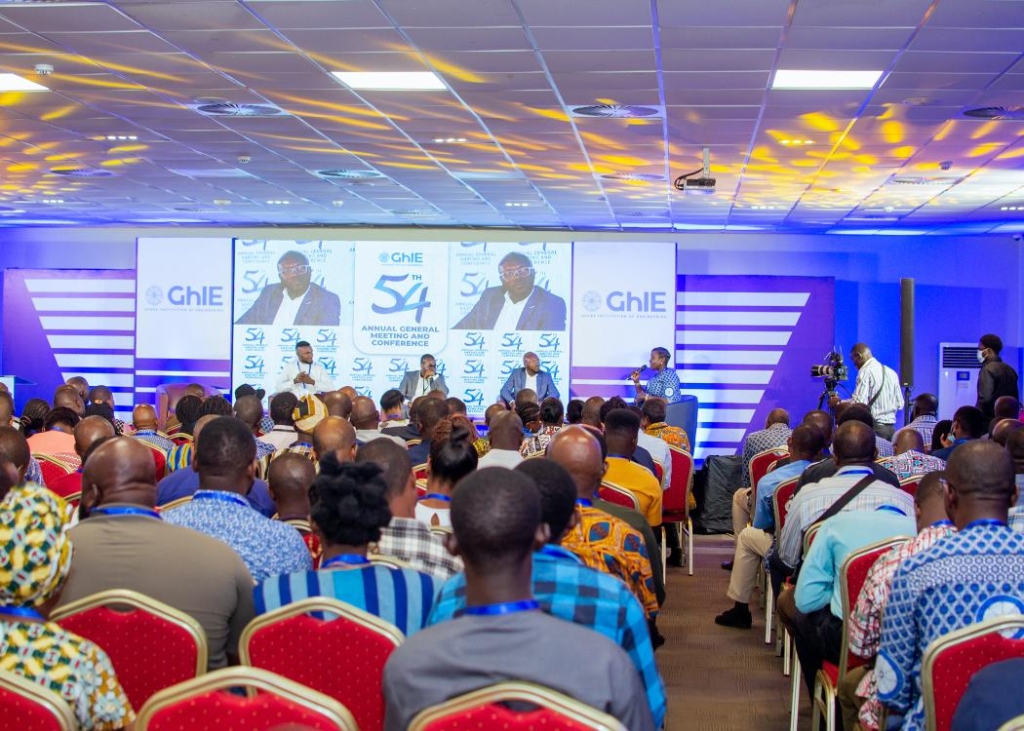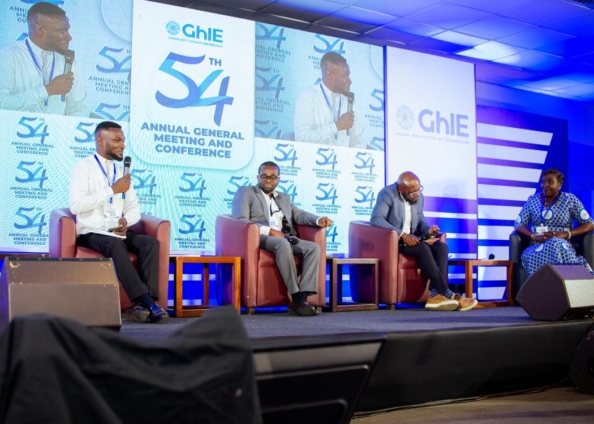The Ghana Institution of Engineering has successfully held its 54th Annual General Meeting and Conference.
This year’s event was under the theme "Engineering a Resilient Future: Innovative Solutions for a Sustainable Ghana".
The 54th Annual General Meeting and Conference of the Ghana Institute of Engineering (GhIE) was from March 18 to 22, 2024, with the activities largely held at the Engineers Centre and Fiesta Royale Hotel and climaxed with Engineering Excellence Awards and Banquet Dinner at the Labadi Beach Hotel, Accra, Ghana.
The conference brought together numerous engineers, industry professionals, academics, experts, and policymakers from across Ghana and other African countries, namely Nigeria, Sierra Leone, Kenya, Liberia, and South Africa, to discuss and share insights on the applications of technological innovations and artificial intelligence in providing engineering solutions to facilitate developments in various sectors of the economy for a resilient future.

The conference featured keynote speeches, technical sessions, exhibitions, and panel discussions, covering a broad range of topics on innovative engineering solutions for resilient national development. Other activities included the 25th Anniversary Launch of the Women in Engineering (WINE), the Artisans Forum, the Young Engineers Forum, Engineering Excellence Awards at a Banquet Dinner, and Field Visits to some selected engineering firms within Accra, which provided a great opportunity for networking and relaxation.
In his opening address at the Conference, the President of GhIE, Ing. Kwabena Bempong, stated that the institution recognises the need to include resiliency in its aspirations and ensure that engineering practitioners provide innovative solutions; hence, the theme of “Engineering a Resilient Future: Innovative Solutions for a Sustainable Ghana” for the conference.
The special guest of honour for the conference, Lawyer Sam Okudjeto, who is a member of the Council of State of the Republic of Ghana, emphasised the critical role of engineering in national development and the need for engineers to collaborate and come up with solutions to address the many challenges in society.
He also encouraged engineers to be bold and courageous in the implementation of projects and not be persuaded by influence from people in authority against their professional ethics.
The conference was a great success, and the insights, decisions, and recommendations are expected to contribute significantly to promoting resilient engineering solutions for the development of the nation and beyond.
Some of the key takeaways from the various sessions and activities include:
• Engineering a resilient future involves designing systems, infrastructure, and technologies that can withstand and adapt to various challenges. This can be done through resilient engineering infrastructure, cities, economic transformation, and social inclusion. Therefore, there is a need for interdisciplinary collaboration, innovative approaches, a new mindset, and long-term planning to build infrastructure that can withstand future challenges. Particularly, collaboration among all relevant stakeholders must be strengthened and factored into the design, construction, and implementation of projects to reduce risk, cost, and redundancies. The GhIE will contribute to this collaboration agenda this year by organising two fora (one to bring all infrastructure service providers and another one for industry and academia) to facilitate stakeholder collaborations towards engineering a resilient future.
• A reliable power supply is a shared responsibility of the utility providers (like the Electricity Company of Ghana) and the public. Therefore, the public must support the utility providers in delivering their mandate by helping protect their infrastructure from theft and vandalism. Additionally, the providers must adopt digitization as an innovative approach for service improvement and must advocate for users to patronize their digital platforms.
• Artificial Intelligence (AI) has come to stay and is transforming engineering at all levels. Therefore, there is the need to up-skill it at all levels of professional engineering training and practice to ensure engineers stay relevant globally and facilitate national development at a faster pace. Additionally, Ghana must prioritise AI by paying particular attention to the three key enablers of AI, viz. infrastructure, data, and talent, to fully benefit from it. The GhIE will, henceforth, work with the universities to ensure the inclusion of AI in all engineering and professional development programmes.
• Ghana’s infrastructural development and economic growth will depend heavily on the energy used for industrialization since the countries with high GDPs exhibit significant energy usage. Therefore, Ghana must fully harness its energy consumption for growth while taking appropriate decarbonisation steps to achieve sustainable development goals. As a result, strategies such as green design and renewable energy are the best options to achieve a sustainable future for Ghana and must be adopted. Additionally, there should be a collaboration between industries and academia to support Ghana in implementing its energy transition plan.
• To fast-track the development of a nation, policymaking must be based on sound engineering advice whereby there will be engineering considerations for all public projects/initiatives in all sectors of the national economy. Additionally, incentives should be provided for the commercialisation of engineering innovations to encourage more industry-academic collaborations for research and development to generate solution-driven innovative technologies to address challenges in urban planning and drainage systems, housing, waste disposal, agriculture, and water supply in the country.
Latest Stories
-
NAPO commissions library to honour Atta-Mills’ memory
5 mins -
OmniBSIC Bank champions health and wellness with thriving community walk
6 mins -
Kora Wearables unveils Neo: The Ultimate Smartwatch for Ghana’s tech-savvy and health-conscious users
11 mins -
NDC supports Dampare’s ‘no guns at polling stations’ directive
13 mins -
Police officer interdicted after video of assault goes viral
31 mins -
KNUST’s Prof. Reginald Annan named first African recipient of World Cancer Research Fund
32 mins -
George Twum-Barimah-Adu pledges inclusive cabinet with Minority and Majority leaders
1 hour -
Labourer jailed 5 years for inflicting cutlass wounds on businessman
1 hour -
Parliament urged to fast-track passage of Road Traffic Amendment Bill
1 hour -
Mr Daniel Kofi Asante aka Electrician
1 hour -
Minerals Commission, Solidaridad unveils forum to tackle child labour in mining sector
1 hour -
Election 2024: Engagement with security services productive – NDC
1 hour -
Retain NPP for the good of Ghana – Rebecca Akufo-Addo
1 hour -
‘Let’s work together to improve sanitation, promote health outcome’ – Sector Minister urges
1 hour -
Ellembelle MP cuts sod for six-unit classroom block at Nkroful Agric SHS
2 hours

